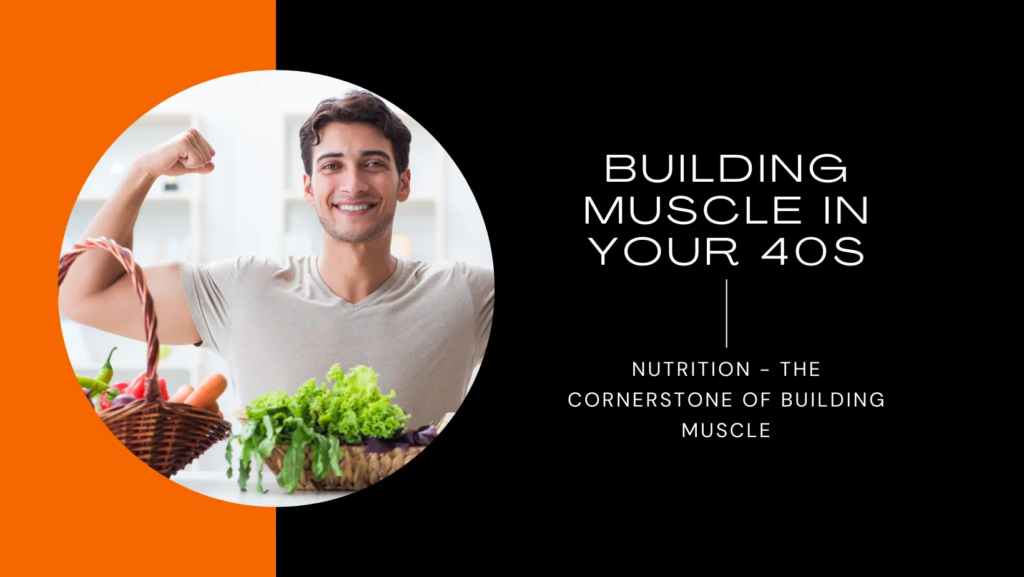Introduction
In the second part of our series covering the five critical factors for muscle gain in your 40s, we’ll be delving into the pivotal role of nutrition. Your dietary choices form the bedrock of your muscle-building journey, and in this stage of life, they carry even more significance. Proper nutrition can make or break your progress. In this blog, we’ll explore the vital aspects of nutrition that impact muscle gain and provide practical, science-backed advice to fuel your body effectively. Get ready to uncover how the right nutrition strategy can unlock your muscle-building potential in your 40s.
Protein: The Building Blocks of Muscle
Protein is your body’s construction material for muscle tissue. When you engage in resistance training, you create tiny tears in your muscles, and protein is essential for repairing and rebuilding them. Amino acids, the building blocks of protein, play a central role. Ensuring you consume an adequate amount of protein—about 1.2-2.2 grams per kilogram of body weight per day—is critical.
To maximize protein utilization, aim for roughly 20-40 grams of protein per meal, distributed throughout your day. This ensures a steady supply of amino acids to support muscle repair and growth.
Carbohydrates: Fueling Your Workouts
Carbohydrates serve as your primary energy source, especially during high-intensity workouts. Complex carbohydrates like whole grains, sweet potatoes, and quinoa provide a steady release of energy, ensuring you have the stamina to power through your training sessions. They also help replenish glycogen stores in your muscles, crucial for post-exercise recovery. Timing is key; consuming carbohydrates before and after your workouts ensures you have the energy needed to train effectively and aids in recovery.
Healthy Fats: Balancing Hormones
Healthy fats are essential for hormonal balance, including the production of testosterone, a key hormone for muscle growth. Incorporating sources such as avocados, nuts, seeds, olive oil, and fatty fish like salmon into your meals can help support your hormonal health. Aim for about 20-35% of your daily calorie intake to come from healthy fats.
Meal Timing: Precision Matters
The timing of your meals may play a small role in optimizing muscle gain for the average person; However, it’s important to emphasize that meal timing is a complementary strategy rather than a primary driver of muscle gain. Hitting your protein targets consistently should take precedence.. Eating a balanced meal or snack containing both protein and carbohydrates within an hour before and after your workouts can enhance muscle repair and growth and reduce post-exercise muscle soreness.
Hydration: Often Overlooked but Crucial
Proper hydration is sometimes overlooked but is crucial for muscle function and recovery. When your muscles are adequately hydrated, they are well-lubricated, reducing the risk of injury during workouts.
Your fluid needs increase significantly during exercise, especially in hot and humid conditions. It’s recommended to consume roughly 7-10 ounces (200-300 millilitres) of water every 10-20 minutes of exercise. After exercise, aim to replace fluids lost during the workout by drinking at least 16-24 ounces (475-710 millilitres) of water for every pound (0.45 kilograms) of body weight lost.
Electrolytes, such as sodium, potassium, calcium, and magnesium, are essential minerals that play a crucial role in muscle function. When you sweat, you lose not only water but also electrolytes. Replenishing electrolytes is essential for maintaining muscle function and preventing muscle cramps. You can obtain electrolytes through sports drinks or foods like bananas, oranges, and salted nuts.
Conclusion
Understanding the context behind each nutrition element is fundamental to your muscle-building journey in your 40s. Protein repairs and builds muscle tissue, carbohydrates fuel your workouts and recovery, healthy fats support hormonal balance, meal timing optimizes nutrient utilization, and hydration keeps your muscles functioning at their best.
Remember that while nutrition is a cornerstone, it’s just one part of the puzzle. Addressing the other critical factors, including previous training experience, sleep, stress management, and hormonal balance, will further enhance your muscle gain journey. Taking a holistic approach and making informed dietary choices will unlock your full muscle-building potential and achieve your fitness goals in your 40s.

